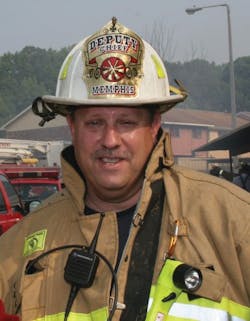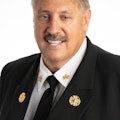It’s summertime again, and summer means more fun things to do. In keeping with the summer tradition of having fun, it’s time to look at some new terms that are making their way into the mainstream EMS vernacular of practicing medicine in the streets.
For instance, the commonly used term “ABCs” does not necessarily have to mean “airway, breathing and circulation.” It could mean “airway, billing and collection”; “airway breathing, cancel ALS; airway, Blue Cross, can you walk?”; “ambulate before carry”; “always bring clipboard”; “ambulance before cops”; “automobile? bus? cab?”; or “ambulance before cruiser.”
“EMS” normally means “emergency medical services.” But in the summertime fun it can mean “every marriage suffers;” “eat more sandwiches”; or “earn money sleeping.”
Every day in this profession, “EMT” means “emergency medical technician,” but for the more creative minds, it could also mean “extra man on truck”; “extraordinary masochistic tendencies”; “expensive mobile taxi”; “every marriage terminates”; “early morning trauma”; “early morning transfer”; “every menial task”; “every meaningless transport”; “emergency medical taxi”; or “easiest mode of transportation.”
“CPR” does not always mean someone pumping on a chest. It can also mean “continually practicing reality”; “can’t possibly recover”; or “check pockets and run.”
In most circles, “ALS” means “advanced life support,” but it can also have another meaning when you hear the engine company officer call for ALS. It can mean “absolute loss of sense” or “always lots of suitcases.” If ALS is not available, you will have to revert back to your “BLS” skills, which may mean “barely life support” or “basic lifting service” in addition to the usual “basic life support.”
We also experience many different types of syndromes when working in this profession. Some of my more favorite syndromes include “JACOBS Syndrome.” JACOBS stands for “just a couple of beers” when you ask the patient who can barely stand, has slurred speech that a United Nations translator would not be able to comprehend and just crashed their car into a stationary object how many beers they had to drink.
There is also the “HONDA syndrome.” This typically is associated with patients who are “hypertensive, obese, non-compliant; diabetic and adult.” Another syndrome many firefighter/paramedics see around the first of the month or around full moons is “TIS,” which stands for “transient ill syndrome” and is usually reserved for frequent-flyer patients who change their illnesses and symptoms several times enroute to the hospital.
Finally, I have seen this syndrome played out many times on the streets of St. Louis, MO, and Memphis, TN. It is called the “Sudden Incarceration Syndrome” or “Incarceritis.” This is the amazing medical condition that a person develops after being notified they are under arrest. Some refer to this as “Miranda Angina.” Typically, these patients have a sudden allergic reaction to the metal contained in handcuffs. In similar situations, many times when given the option of going to jail or the hospital, a person will suddenly and for unexplained reasons choose the hospital.
One of my much-loved scenes in any movie or TV program is when they load the patient in the back of the ambulance, close the rear doors and somebody invariably slaps the back of the ambulance for it to take off. Within the industry this is called “ambuslaps.”
Of course, we have all worked with co-workers who make us wonder how they passed the test to get on the department. These co-workers are usually referred to as “stems.” A “stem” is a co-worker who obviously possesses only the basic and rudimentary brain functions necessary to sustain life. They possess a paramedic license from the state and are nationally registered, but how they got to this level cannot be explained.
Other people we may work with are commonly known as “Randy Rescues” or “Mr. Gadget.” These are co-workers who possess and own virtually every possible item that can be purchased out of the Gall’s catalog. They carry many of these gadgets on them and if they were to fall into water, they would sink to the bottom because of the weight.
Then, there is the familiar “EMS wedgie.” This is the condition that results when you are carrying a patient on a stretcher down the stairs and you are at the head. Typically, a firefighter will grab your belt from behind and pull in a rear and upward motion to prevent you from possibly falling down the stairs, resulting in a wedgie.
Of course, all of this is for fun. Professionals in the fire service should always take their job seriously when the alarm sounds and we are called into action. When lives or property is involved, that is not the time to joke. We should be respectful of all patients regardless of their complaint or condition. Enjoy your summer and stay safe!
For more news and training on EMS, visit http://EMSWorld.com/.
GARY LUDWIG, a Firehouse® contributing editor, has 35 years of fire, rescue and EMS experience. He currently serves as a deputy fire chief for the Memphis, TN, Fire Department. Ludwig is also chair of the EMS Section for the International Association of Fire Chiefs. He can be reached through his website at garyludwig.com.
About the Author
Gary Ludwig
GARY LUDWIG has served in three fire departments over his career: St. Louis, Memphis, and Champaign, IL. His fire, EMS and rescue career spanned a total of 46 years, and he has been a paramedic for over 44 years. Ludwig served as president of the International Association of Fire Chiefs in 2019-20. He has a Master’s degree in Business and Management, has written over 500 articles for professional fire and EMS publications and is the author of seven books.
Connect with Gary
Email: [email protected]
Facebook: Gary Ludwig
Twitter: @ChiefGaryLudwig
Website: garyludwig.com

